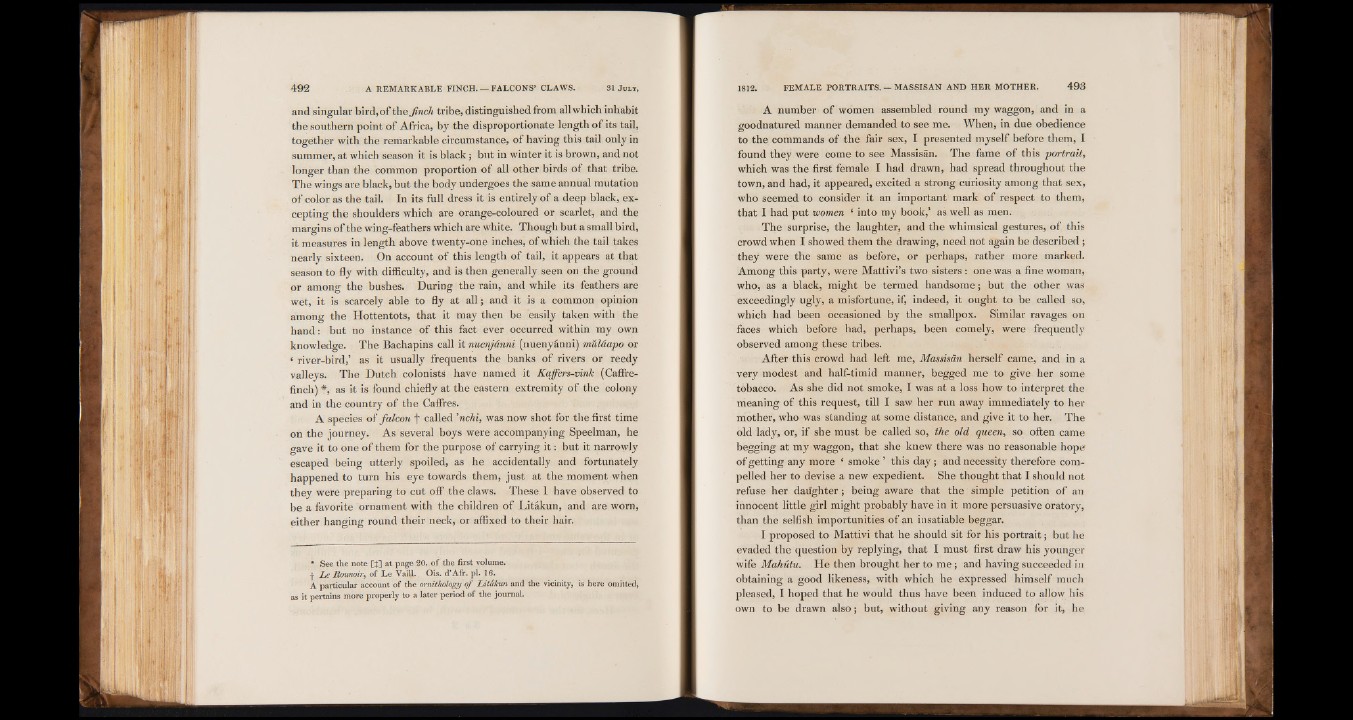
and singular bird,of the finch tribe, distinguished from all which inhabit
the southern point of Africa, by the disproportionate length of its tail,
together with the remarkable circumstance, of having this tail only in
summer, at which season it is black ; but in winter it is brown, and not
longer than the common proportion of all other birds of that tribe.
The wings are black, but the body undergoes the same annual mutation
of color as the tail. In its full dress it is entirely of a deep black, excepting
the shoulders which are orange-coloured or scarlet, and the
margins of the wing-feathers which are white. Though but a small bird,
it measures in length above twenty-one inches, of which the tail takes
nearly sixteen. On account of this length of tail, it appears at that
season to fly with difficulty, and is then generally seen on the ground
or among the bushes. During the rain, and while its feathers are
wet, it is scarcely able to fly at all; and it is a common opinion
among the Hottentots, that it may then be easily taken with the
hand: but no instance of this fact ever occurred within my own
knowledge. The Bachapins call it nuenjanni (nuenyanni) muldapo or
I river-bird,’ as it usually frequents the banks of rivers or reedy
valleys. The Dutch colonists have named it Kaffers-vink (Caffre-
finch) *, as it is found chiefly at the eastern extremity of the colony
and in the country of the Caffres.
A species of falcon f called ’nchi, was now shot for the first time
on the journey. As several boys were accompanying Speelman, he
gave it to one of them for the purpose of carrying it : but it narrowly
escaped being utterly spoiled, as he accidentally and fortunately
happened to turn his eye towards them, just at the moment when
they were preparing to cut off the claws. These 1 have observed to
be a favorite ornament with the children of Litakun, and are worn,
either hanging round their neck, or affixed to their hair.
* See the note [£] at page 20. of the first volume.
+ L e Rounoir, of Le VaiU. Ois. d’Afr. pi. 16.
A particular account of the ornithology o f Litakun and the vicinity, is here omitted,
as it pertains more properly to a later period of the journal.
A number of women assembled round my waggon, and in a
goodnatured manner demanded to see me. When, in due obedience
to the commands of the fair sex, I presented myself before them, I
found they were come to see Massisan. The fame of this portrait,
which was the first female I had drawn, had spread throughout the
town, and had, it appeared, excited a strong curiosity among that sex,
who seemed to consider it an important mark of respect to them,
that I had put iwomen ‘ into my book,’ as well as men.
The surprise, the laughter, and the whimsical gestures, of this
crowd when I showed them the drawing, need not again be described;
they were the same as before, or perhaps, rather more marked.
Among this party, were Mattivi’s two sisters: one was a fine woman,
who, as a black, might be termed handsome; but the other was
exceedingly ugly, a misfortune, if, indeed, it ought to be called so,
which had been occasioned by the smallpox. Similar ravages on
faces which before had, perhaps, been comely, were frequently
observed among these tribes.
After this crowd had left me, Massisan herself came, and in a
very modest and half-timid manner, begged me to give her some
tobacco. As she did not smoke, I was at a loss how to interpret the
meaning of this request, till I saw her run away immediately to her
mother, who was standing at some distance, and give it to her. The
old lady, or, if she must be called so, the old queen, so often came
begging at my waggon, that she knew there was no reasonable hope
of getting any more ‘ smoke ’ this day ; and necessity therefore compelled
her to devise a new expedient. She thought that I should not
refuse her daughter; being aware that the simple petition of an
innocent little girl might probably have in it more persuasive oratory,
than the selfish importunities of an insatiable beggar.
I proposed to Mattivi that he should sit for his portrait; but he
evaded the question by replying, that I must first draw his younger
wife Mahutu. He then brought her to m e; and having succeeded in
obtaining a good likeness, with which he expressed himself much
pleased, I hoped that he would thus have been induced to allow his
own to be drawn also; but, without giving any reason for it, he